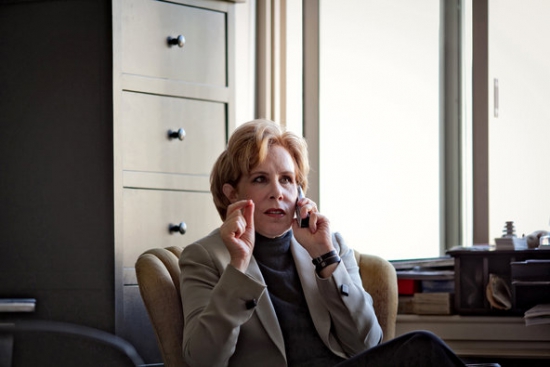The hedge fund industry is like sports, performance is everything. So after years of poor performance in an effort to improve their game, the industry increasingly turned to self-help programs., sometimes called thought products (mindware products).

Coach Denise Schull in his office. Works on the study of unconscious influences on traders.
To meet this demand, a new industry has emerged, in which statisticians track information about the results, and trainers and psychiatrists are working on, to help hedge fund managers make smarter decisions, making them talk about their personal stories and prejudices. The logic is this: if an athlete can resort to coaching, why not apply this to traders?
The idea is not new, but it took a while, so that it gains momentum. In the early nineties Stephen A. Cohen, founder of SAC Capital Advisors, hired Ari Kiev to train traders of the company (Ari Kiev) - psychiatrist, who previously worked with athletes.
For two decades, building on the growing popularity of the behavioral science decision making literature, Wall Street is gradually adopting the idea of, that self-awareness can lead to better business and financial decisions. Armed with borrowing from books, like Daniel Kahneman's Thinking, fast and slow " (Daniel Kahneman “Thinking, Fast and Slow”), trade trainers talk about systemic, periodic and predictable errors, to which people are prone.
“If you look at finance, then you will see, that we are insanely passionate about performance analysis ", - said Simon Savage, which manages the funds of GLG Partners (divisions of the Man Group) - one of the world's largest hedge funds. In sports, like baseball, process research, leading to the result, настолько же важно, as well as the result itself, - says Mr. Savage, - so it is logical to apply this thinking to investing.
GLG Partners speaks, that they spent significant resources on identifying that, why some of their traders are successful, and some are unlucky. Seven years ago, the company began collecting data for hit analysis. (hit rate) their traders, that is, the percentage of successful transactions.
This simple study gave traders important feedback., said Mr Savage, but it missed the answer to one essential question: how GLG could help its traders prevent future mistakes? Therefore, about 18 months ago, the company hired a sales coach, чтобы тот, working in London with thirty employees of the firm, helped find the answer.
“The most common measure of skill seems to be performance, but performance is not a measure of skill - it is a function of skill and luck. ", Flynn Claire Levy says (Clare Flynn Levy) - entrepreneur and former fund manager. Her startup, Essentia Analytics, uses software, which allows hedge funds to organize data storage for individual traders, as well as the history of their financial results.
If you can't tell the difference between skill and luck, “How can you give advice to someone to improve their performance??», - says Ms. Levy.
Man Group uses Essentia software as a trader performance measurement tool to, so they can look back and notice, what needs to be worked out. Then, together with the coach, they try to determine the reasons, by which they make certain mistakes.
Trade trainers focus on the same areas, what is also relevant for athletes - rest, patience, horizon, intuition and personal obstacles.
Denise Schull - coach, who wrote “Mind Games in the Market: radical investment psychology, trading and risk " (Denise Shull “Market Mind Games: A Radical Psychology of Investing, Trading and Risk”), - started her career studying neurology at the University of Chicago, and then became a trader on the Chicago Mercantile Exchange (CME). Now she helps clients identify unconscious characteristics, influencing their decisions.
Our "luggage" [I mean a set of beliefs, knowledge and experience, forcing a person to think in a certain way - approx. per.] affects our performance ", - says Ms. Schull. “If you become more conscious about your baggage, you can change yourself ".
One of Ms Schull's recent clients runs the trading desk of one of the major foreign banks.. He asked for help, so upset about, that I could never bring myself to make daring deals. Together they revealed, that his lack of appetite for risk comes from a conservative mother. Miss Schull said, that this revelation helped her client feel bolder and start bidding higher.
Personal stories play a role in, how we make decisions. There are more 50 various types of behavioral abnormalities (предубеждений), to which people are usually exposed: unsurprisingly, that hedge fund managers, usually, vulnerable to similar deviations.
The most common of these is fear of loss, as a result of which some managers sell shares or exit positions prematurely - says Rick Di Maskio, CEO of Inalytics - company, which provides hedge funds with software to keep track of their traders.
Mr Di Maschio says, what convinces its clients that, that early sales cost their companies a pretty penny. In one of the cases, Mr. DiMasko counted, that such a deviation cost the hedge fund a third of its annual performance.
hedge funds, who have already tried a similar analysis and coaching they say, that it helps to significantly reduce the propensity of managers to make predictable mistakes, although it does not eliminate them completely.
Many hedge funds are considering psychological intervention, but will prefer not to talk about it publicly. In the world, where the ego reigns, and managers are paid for their strong opinion, admitting one's own mistakes and the possibility of learning from these mistakes, still hard to sell.
“Вероятно, there is a stigma about financial performance coaching ”, - says a retired hedge fund manager, who still manages personal investments and has agreed to communicate only on condition of anonymity.
Nevertheless, firms, similar to Man Group, keep going forward, exploring new areas of behavioral science. GLG London office traders hooked up to heart monitors last summer, to check their stress level in certain situations.
Mr Savage would like to follow other biometrics too. “We're going to walk this path, because you can do so much on it ". Joking, он добавил: “A little short of buccal strokes, pin pricks and invasive tests "

